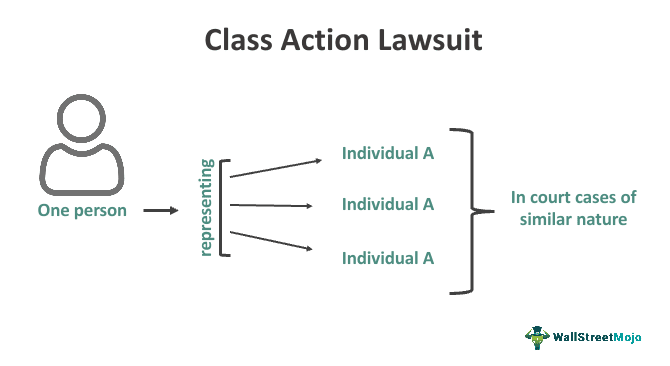Legal Advocacy Unveiled: Your Go-To Resource for Class Action Lawsuit Information
Wiki Article
Comprehending Class Activity Lawsuit: A Guide for Lawyers
Class activity claims have ended up being an important part of the lawful landscape, permitting for the debt consolidation of several insurance claims right into a single activity. For legal representatives, recognizing the details of class action lawsuits is essential in efficiently representing their clients. This thorough overview explores the fundamentals of course activity suits, from identifying potential class members to navigating the qualification procedure. Furthermore, it dives right into essential techniques for handling class action litigation and provides insights right into obtaining and working out approval for negotiations. By delving right into the complexities of class action claims, this guide equips lawyers with the expertise and tools required to efficiently browse this complicated area of legislation.The Fundamentals of Class Action Suits
Class action claims are a legal mechanism employed to combine comparable cases from a group of individuals right into a single legal action, supplying a affordable and reliable approach to looking for justice and resolution. This type of lawsuit permits a representative plaintiff, acting on part of the entire course, to bring a claim against an offender who has actually supposedly created injury or violated the civil liberties of numerous people.The fundamental demands for bringing a course action claim include numerosity, commonality, typicality, and competence of representation. Numerosity refers to the truth that the course need to be so large that joinder of all members would certainly be not practical. Commonality means that there should prevail concerns of law or reality that are shared by all participants of the class. Typicality requires that the cases of the representative complainant are typical of the claims of the entire course. Lastly, adequacy of depiction guarantees that the representative complainant will effectively stand for the interests of the whole class.
Class action claims can be advantageous for both offenders and complainants. For complainants, it permits them to pool their resources and share the dangers and costs connected with litigation. It additionally supplies an equal opportunity when they are up versus huge companies or entities. For accuseds, it offers the possibility to successfully fix multiple claims in a single lawsuit, preventing the demand to resist various private claims.
Identifying and Assessing Prospective Class Participants
After developing the fundamental demands for a class action suit, the following action is to identify and examine possible course participants. If they fulfill the essential requirements., this procedure includes establishing who might be component of the course and assessing their claims to determine.To recognize possible class members, legal representatives usually conduct considerable study and gather pertinent information. This may entail examining documents, carrying out meetings, and checking out documents to identify individuals or entities that might have been influenced by the alleged misbehavior. It is critical to establish a extensive and clear listing of possible course participants to make certain that all influenced celebrations are included in the suit.
When possible course members have actually been recognized, the next step is to examine their claims. If they fulfill the legal requirements for class certification, this includes examining the values of each individual claim to determine. Lawyers need to thoroughly analyze the facts, evidence, and lawful theories of each possible course participant's insurance claim to ensure that they have a practical case.
Assessing possible course participants likewise entails determining whether they satisfy the class definition and have actually endured comparable harm as a result of the offender's activities. This calls for comparing the realities and situations of each prospective course member's scenario to the allegations and lawful theories presented in the suit.
Navigating the Course Accreditation Refine
To successfully navigate the course qualification process, legal representatives need to faithfully abide by the procedural demands stated by the court. Course certification is an essential action in a class activity claim, as it identifies whether an instance can continue as a class activity, representing a team of individuals that have similar claims versus a defendant. The process involves pleasing details requirements, such as numerosity, commonness, typicality, and competence of representation.Class action lawsuit First of all, lawyers should establish numerosity by showing that the class is so huge that private joinder is not practical. This can be achieved with evidence or specialist testimony. They have to develop commonality by showing that there are usual questions of law or truth that predominate over individual concerns. This needs a comprehensive analysis of the defenses and cases entailed.
Next, attorneys have to reveal typicality, which indicates that the depictive complainant's insurance claims are common of the claims of the class members. This ensures that the rate of interests of the representative plaintiff align with the rate of interests of the course. Lastly, attorneys have to demonstrate competence of depiction, indicating that the representative plaintiff and their guidance will rather and appropriately stand for the interests of the course.
To navigate this procedure effectively, legal representatives must completely prepare by carrying out comprehensive study, gathering proof, and establishing a compelling disagreement that satisfies each of these criteria. They must also be prepared to react to any objections or challenges increased by the defendant. By vigilantly adhering to the procedural requirements stated by the court, legal representatives can boost their chances of obtaining class accreditation and advancing the interests of the course participants.

Secret Techniques for Taking Care Of Class Action Lawsuits
Upon successfully navigating the course certification process, legal representatives should after that implement essential techniques for efficiently handling class activity litigation. These approaches are important to guarantee that the situation proceeds efficiently and efficiently, ultimately maximizing the possibilities of a desirable end result for the course members.
One trick strategy is to develop a natural and strong lawful group (Class action lawsuit). This involves setting up a group of lawyers with knowledge in class activity litigation, as well as various other relevant areas such as the certain industry or subject matter associated with the situation. A versatile group can bring different viewpoints and skills to the table, boosting the general efficiency of the lawsuits
An additional essential approach is to develop a well-balanced and thorough litigation plan. This plan ought to detail the general purposes of the instance, along with the specific lawful concepts and disagreements that will certainly be gone after. It ought to also consist of a timeline and budget to make certain that the case remains on track and within the assigned resources.
Additionally, lawyers should proactively engage with the course participants throughout the litigation procedure (Class action lawsuit). This includes supplying regular updates on the development of the situation, seeking input and responses from the class participants, and attending to any kind of concerns or concerns they may have. By fostering open interaction and cooperation, attorneys can develop count on and assistance among the course participants, which can be important in accomplishing an effective resolution
Settling Class Activity Legal Actions: Arrangement and Authorization
When it involves resolving course action claims, reliable arrangement and getting authorization are crucial actions in accomplishing a resolution. Course activity legal actions are complicated and entail a large number of plaintiffs, making it important to reach a settlement that is sufficient and fair to all events entailed.
As soon as a negotiation contract is reached, it must be approved by the court. The court's function in this process is to make sure that the negotiation is reasonable, reasonable, and adequately safeguards the rate of interests of the course participants. The court will consider elements such as the nature of the insurance claims, the toughness of the proof, the possible healing for the class participants, and any objections raised by class participants.
Getting court authorization is important as it offers finality to the settlement and secures the passions of the class members. It ensures that the settlement is binding and enforceable, and class members can obtain their rightful settlement.
Final Thought

Class activity claims have actually become an indispensable part of the lawful landscape, permitting for the loan consolidation of multiple claims right into a solitary activity. Class certification is a crucial action in a course action legal action, as it identifies whether an instance can proceed as a class activity, standing for a team of individuals who have similar cases against an accused. By vigilantly sticking to the procedural demands established forth by the court, lawyers can boost their opportunities of obtaining course certification and advancing the passions of the class participants.
The court will certainly take into consideration variables such as the nature of the insurance claims, the toughness of the evidence, the potential healing for the class members, and any type of arguments raised by class participants.
By identifying and evaluating possible course participants, lawyers can identify the viability of a course action claim.
Report this wiki page